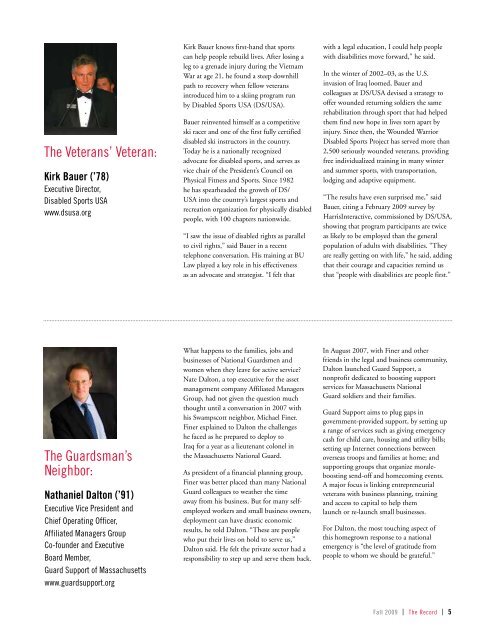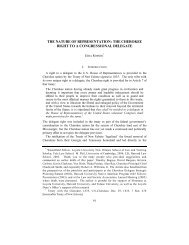Climbing Above the Culture Clash
Climbing Above the Culture Clash
Climbing Above the Culture Clash
Create successful ePaper yourself
Turn your PDF publications into a flip-book with our unique Google optimized e-Paper software.
The Veterans’ Veteran:<br />
Kirk Bauer (’78)<br />
Executive Director,<br />
Disabled Sports USA<br />
www.dsusa.org<br />
Kirk Bauer knows first-hand that sports<br />
can help people rebuild lives. After losing a<br />
leg to a grenade injury during <strong>the</strong> Vietnam<br />
War at age 21, he found a steep downhill<br />
path to recovery when fellow veterans<br />
introduced him to a skiing program run<br />
by Disabled Sports USA (DS/USA).<br />
Bauer reinvented himself as a competitive<br />
ski racer and one of <strong>the</strong> first fully certified<br />
disabled ski instructors in <strong>the</strong> country.<br />
Today he is a nationally recognized<br />
advocate for disabled sports, and serves as<br />
vice chair of <strong>the</strong> President’s Council on<br />
Physical Fitness and Sports. Since 1982<br />
he has spearheaded <strong>the</strong> growth of DS/<br />
USA into <strong>the</strong> country’s largest sports and<br />
recreation organization for physically disabled<br />
people, with 100 chapters nationwide.<br />
“I saw <strong>the</strong> issue of disabled rights as parallel<br />
to civil rights,” said Bauer in a recent<br />
telephone conversation. His training at BU<br />
Law played a key role in his effectiveness<br />
as an advocate and strategist. “I felt that<br />
with a legal education, I could help people<br />
with disabilities move forward,” he said.<br />
In <strong>the</strong> winter of 2002–03, as <strong>the</strong> U.S.<br />
invasion of Iraq loomed, Bauer and<br />
colleagues at DS/USA devised a strategy to<br />
offer wounded returning soldiers <strong>the</strong> same<br />
rehabilitation through sport that had helped<br />
<strong>the</strong>m find new hope in lives torn apart by<br />
injury. Since <strong>the</strong>n, <strong>the</strong> Wounded Warrior<br />
Disabled Sports Project has served more than<br />
2,500 seriously wounded veterans, providing<br />
free individualized training in many winter<br />
and summer sports, with transportation,<br />
lodging and adaptive equipment.<br />
“The results have even surprised me,” said<br />
Bauer, citing a February 2009 survey by<br />
HarrisInteractive, commissioned by DS/USA,<br />
showing that program participants are twice<br />
as likely to be employed than <strong>the</strong> general<br />
population of adults with disabilities. “They<br />
are really getting on with life,” he said, adding<br />
that <strong>the</strong>ir courage and capacities remind us<br />
that “people with disabilities are people first.”<br />
The Guardsman’s<br />
Neighbor:<br />
Nathaniel Dalton (’91)<br />
Executive Vice President and<br />
Chief Operating Officer,<br />
Affiliated Managers Group<br />
Co-founder and Executive<br />
Board Member,<br />
Guard Support of Massachusetts<br />
www.guardsupport.org<br />
What happens to <strong>the</strong> families, jobs and<br />
businesses of National Guardsmen and<br />
women when <strong>the</strong>y leave for active service<br />
Nate Dalton, a top executive for <strong>the</strong> asset<br />
management company Affiliated Managers<br />
Group, had not given <strong>the</strong> question much<br />
thought until a conversation in 2007 with<br />
his Swampscott neighbor, Michael Finer.<br />
Finer explained to Dalton <strong>the</strong> challenges<br />
he faced as he prepared to deploy to<br />
Iraq for a year as a lieutenant colonel in<br />
<strong>the</strong> Massachusetts National Guard.<br />
As president of a financial planning group,<br />
Finer was better placed than many National<br />
Guard colleagues to wea<strong>the</strong>r <strong>the</strong> time<br />
away from his business. But for many selfemployed<br />
workers and small business owners,<br />
deployment can have drastic economic<br />
results, he told Dalton. “These are people<br />
who put <strong>the</strong>ir lives on hold to serve us,”<br />
Dalton said. He felt <strong>the</strong> private sector had a<br />
responsibility to step up and serve <strong>the</strong>m back.<br />
In August 2007, with Finer and o<strong>the</strong>r<br />
friends in <strong>the</strong> legal and business community,<br />
Dalton launched Guard Support, a<br />
nonprofit dedicated to boosting support<br />
services for Massachusetts National<br />
Guard soldiers and <strong>the</strong>ir families.<br />
Guard Support aims to plug gaps in<br />
government-provided support, by setting up<br />
a range of services such as giving emergency<br />
cash for child care, housing and utility bills;<br />
setting up Internet connections between<br />
overseas troops and families at home; and<br />
supporting groups that organize moraleboosting<br />
send-off and homecoming events.<br />
A major focus is linking entrepreneurial<br />
veterans with business planning, training<br />
and access to capital to help <strong>the</strong>m<br />
launch or re-launch small businesses.<br />
For Dalton, <strong>the</strong> most touching aspect of<br />
this homegrown response to a national<br />
emergency is “<strong>the</strong> level of gratitude from<br />
people to whom we should be grateful.”<br />
Fall 2009 | The Record | 5









